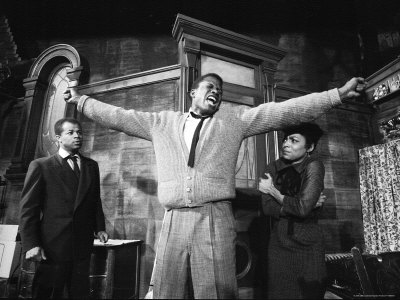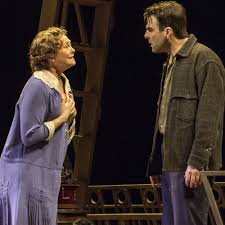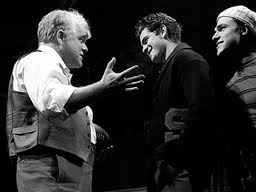

Theatre is an art. Although theatre is an art, it’s an art that thrives on connecting directly and immediately with audiences on various levels, including intellectually, emotionally, and spiritually.
However, at times, it seems as though the theatre intimidates students, and even teachers. Sometimes they feel as if the messages are too deep, that they need some sort of special training to understand what’s happening on stage, or that there is some secret code to unravel before they can get to the meaning of a play or musical. But when it comes to understanding theatre, there is actually no deep secret. It comes down to some basics. Here are a few that you can use to facilitate thoughtful discussion about a show.
Relationships

In most plays or musicals, you find that the writers spend a lot of time on developing relationships between characters. How does one character feel about another? What do they think about them? What do they like and dislike about them? What common experiences do they share? In what areas are they dissimilar? There are many other questions that actors ask when trying to understand their relationship to the people with whom they share the stage and play/musical.
These are questions that are often investigated in rehearsal and around which directors will craft staging, actions and reactions, and other aspects of a production. Often one character’s relationship to another and how it develops over the course of the play will reveal the theme or themes of a play.
A few examples include Willy’s relationship to Biff (Death of a Salesman); Tom’s relationship to Laura and Amanda (The Glass Menagerie), Curly’s relationship to Laurey (Oaklahoma!), Lenny’s relationship to George (Of Mice and Men) Jerry’s relationship to Milo and Lise (An American in Paris), and Pippin’s relationship to the Leading Player (Pippin).
What We Want
If understanding relationships is important to finding meaning in a play, and perhaps even in life, then knowing what a character wants, and whether or not they get it, is essential. In the theatre, actors are striving to discover the motivation for their character’s actions.
Motivation, which is often called demanded objective, is what a character wants. It’s expressed in the infinitive form of a verb. The infinitive form, which uses the word “to,” is active.

Examples of an expression of motivation for a character would be:
- To love
- To feel loved
- To be loved
- To control
- To vanquish
- To win
- To discover
- To understand
- To cope
Discussing the main character’s motivation and the motivation of others can help to generate a deeper understanding of a play or musical.
Fears and Hopes
Along with defining the demanded objectives of certain characters, understanding their hopes and fears can help one to better know who a character is and why they are pursuing a certain path. All of us possess hopes and fears, and if we can see some of those same or even similar hopes and fears in characters on stage, we can start to develop clearer ideas about who they are.
What Did You Think or Feel?

When attending a production one can discern relationships, demanded objectives, and hopes and fears by observing the action on stage and listening to the dialogue and songs. These can also be found and assessed by carefully reading a play, either aloud as a group or quietly on one’s own. However, the fullest meaning of a play or musical is understood through careful observation of a production.
Immediate discussion is not always easy, as students are often sorting through feelings and thoughts of various aspects of what they just observed. A helpful tool in generating discussion of any play is to ask students to answer a few simple questions as they watch the show.
One Example:
As you watch the play list/describe:
- Three memorable moments briefly stating what occurred.
- The final action or moment of the play.
After the play, for each of the above:
- Describe who was affected in each of these moments and in what way?
- What was their next action after they experienced the moment?
- What did you feel or think concerning the main character and the final moment in the play?
Discovering the Human Element
Use questions like these, which focus on characters, their experiences, and actions and reactions, to generate meaningful discussion that will help students relate to and find meaning in the play or musical they have just experienced. Focus on the human element, what everyone can relate to, to get to a deeper discussion naturally.

 Random Item
Random Item